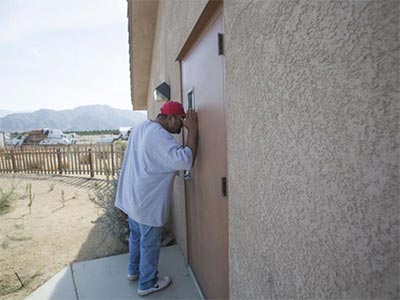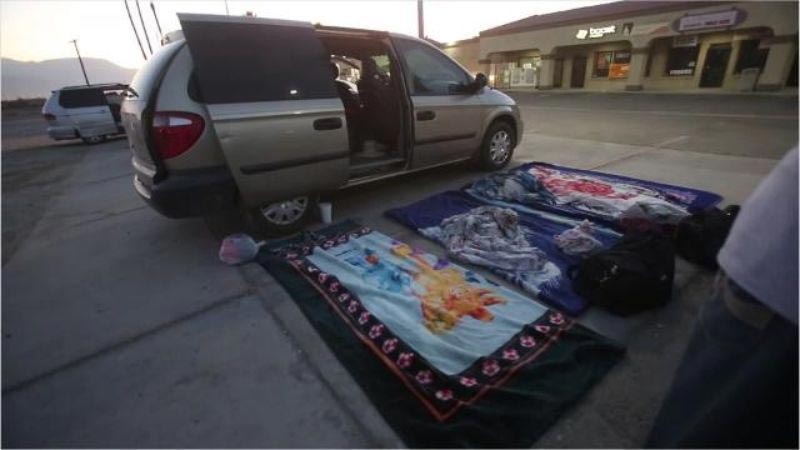Nearly one year after The Desert Sun reported on the lack of housing for migrant farmworkers in Mecca, the problem has gotten worse.
The San Felipe Migrant Housing Complex, one of only two developments built specifically for farmworkers who come to the valley during the summer grape harvest, closed.
“It was abandoned,” said Marin Zavala, who stayed in San Felipe last summer. “I saw cobwebs and overgrown grass.”
San Felipe had 48 beds, air-conditioned rooms and clean bathrooms. Zavala called the facilities nicer than his own home. Beds in the complex were in such high demand last year that farmworkers arrived weeks before the harvest began to secure a spot.
Nearly one year after The Desert Sun reported on the lack of housing for migrant farmworkers in Mecca, the problem has gotten worse.
The San Felipe Migrant Housing Complex, one of only two developments built specifically for farmworkers who come to the valley during the summer grape harvest, closed.
“It was abandoned,” said Marin Zavala, who stayed in San Felipe last summer. “I saw cobwebs and overgrown grass.”
San Felipe had 48 beds, air-conditioned rooms and clean bathrooms. Zavala called the facilities nicer than his own home. Beds in the complex were in such high demand last year that farmworkers arrived weeks before the harvest began to secure a spot.

Now that San Felipe is closed, dozens of farmworkers with nowhere else to go are sleeping in sleeping bags under their cars at a parking lot on Hammond Road and Second Street. They sleep on the pavement because the cars get too hot, even at night.
“You wake up dehydrated and then you have to work,” Zavala said of sleeping in the parking lot. “In San Felipe where we had air conditioning, we woke up like a bull ready for 10 hours of work.”
The displaced San Felipe tenants share the space with other farmworkers who have been sleeping in the parking lot for years.
“Nothing has changed,” said Rafael Lopez Garcia, a parking lot veteran.
Homeless farmworkers shower, wash their clothes, eat dinner and rest in an air-conditioned room at the Galilee Center down the street from the parking lot.
The comfort center opened two years ago and gets as many as 150 daily visitors during the grape harvest in April through June.
The Galilee Center does not have any beds or staff to keep the place running overnight.
“When I’m leaving around 7 p.m. the people stay outside because we have a big awning,” said founder Gloria Gomez. “The hardest thing is when you see a child out there. Imagine 110 degrees when they get out of here.”

Apart from the migrants who sleep in the parking lot, there are hundreds of farmworkers crammed into trailers and homes throughout Mecca and Thermal. It is not uncommon for three or four families to live in a single trailer during the harvest, Gomez added.
Plus, the Galilee Center is not exclusively for farmworkers – they offer a variety of services to the working poor.
Landscapers, hospitality workers, construction workers and house cleaners often times do not get paid enough to buy groceries or pay their rent without outside assistance. The Galilee Center holds annual back-to-school backpack and school supply giveaways, distributes toys during Christmas, provides food during Thanksgiving and sells clothes and furniture from their thrift store.
The Galilee Center would like to open an emergency overnight shelter but even that is out of its budget. It would cost at least $150,000 to hire additional staff and buy the necessary cots, blankets and pillows.
One of two affordable housing developments in the area closed last year leaving dozens of migrant farmworkers homeless for the summer grape harvest. Many of the displaced workers are sleeping in a Mecca parking lot.
With San Felipe closed, the only remaining housing for migrant farmworkers is Las Mananitas on Lincoln Street and 63rd Street. The 128-bed facility, operated by the Coachella Valley Housing Coalition, is also so popular that beds fill up weeks before the harvest begins.
The Desert Alliance for Community Empowerment, a nonprofit that still owns the center, shut down after entering tax default status in late 2015. The county housing authority is currently trying to find another operator to run the facilities.
The county is working on other housing projects in Oasis, Coachella and Indio. Some of them are still in the negotiation and land acquisition phases while others are further along, said County Supervisor Manuel Perez.
These projects are not exclusive to farmworkers but would address the affordable housing needs of low-income residents.
“We have to make sure to find housing for the folks who need it,” Perez said.
The housing projects include a 120-space facility and a mix-use development, both in Oasis, a 39-single family home development and an 80-unit development in Coachella and an expanded affordable housing development in Indio.
As for long-term solutions, Perez stressed the need for infrastructure improvements in the unincorporated areas of the county including access to clean water, sewage systems, public parks and healthcare. Mitigating some of the problems of the nearby Salton Sea – which kicks up asthma-inducing dust and spreads the stench of dying fish as the lake rapidly shrinks – could also be an economic boost to those communities, he said.
When it comes to affordable housing for migrant farmworkers in the east valley, the biggest obstacle is funding. From a developer’s perspective, it does not make financial sense to build housing that is only going to be occupied a few months out of the year.
To overcome this obstacle, State Assemblyman Eduardo Garcia introduced a bill that would give tax breaks to developers who build mix-residence affordable housing, meaning units can be occupied by migrant farmworkers or low-income families.
Currently, developers must only house farmworkers in order to receive the tax breaks.
“This conversation about our bill is also impacting in a positive way the larger conversation about the need to invest in affordable housing,” Garcia said. “Anything that happens with affordable housing, people are also going to keep in mind the need for farmworker housing.”
Garcia’s bill, which passed the assembly and has bipartisan support in Sacramento, also increases some of the tax breaks to developers. It still needs to pass the assembly and be signed by the governor in order to go into effect.
Meanwhile, the Zavala brothers sleep in a parking lot so they can pick grapes that are sold in grocery stores throughout the country. When the harvest is over in two weeks, they will head north to Salinas where a labor contractor provides housing and transportation.
Zavala suspects workers receive better treatment up north because there is a labor shortage and growers have to compete for laborers.
“They treat us a little better because there aren’t that many workers,” he said.
